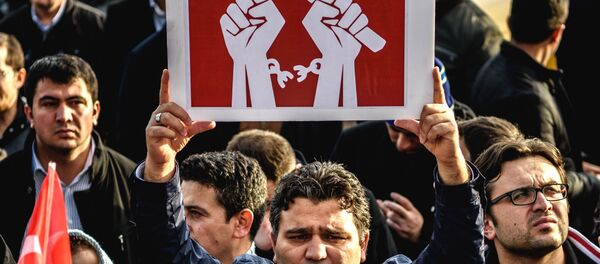Vecih Cüzdan, political observer and editor of Swendika.org news portal, which has seen its content censored eleven times over the past nine months, said that official censorship had become instrumental in the government’s attempts to put a damper on opposition media outlets.
“Censorship has become an instrument of the large-scale war being waged by the Justice and Development Party. In their bid to do this they will keep blocking the people’s access to all independent media resources as long as it takes to shut them up. But the harder they try to do this the more such opposition websites will spring up, because there is no way you can stop this process altogether,” Vecih Cüzdan emphasized.
Commenting on Ankara’s recent order to block internet access in the country to the website of the Russian news agency Sputnik, Cüzdan said that it was a politically-motivated move made as Turkey’s relations with Russia hit a historical low after a Turkish F-16 shot down a Russian bomber in Syria late last year.
Ali Barış Kurt, editor-in-chief of ANF news portal, which was equally shuttered under the controversial Internet Law No 5651 which allows for blocking access to websites with the goal of protecting children from harmful content children” from “harmful content” and the need to “prevent online crime.”
The website was blocked over official fears that it would publish materials critical of the Turkish military operation in the country’s southeast.
As to Ankara’s decision to block Sputnik’s website, Ali Barış Kurt said that the decision reflected the policy of the Freedom and Development Party and the presidential administration.
“The decision to block this Internet resource working in ten languages came at a time when one can hardly see any difference between what the present-day Turkish authorities do and fascist measures taken before.”
“The only way we can prevail in this struggle against state censorship is by sticking firmly to our beliefs and protecting unbiased and independent journalism,” he added.
Çağdaş Kaplan, the editor of DİHA news agency covering the situation in eastern and southeastern Turkey, and which recently had its website blocked for the 33rd time, said that the government hated to have any opinions other than its own voiced in the country and free discussions held on “inconvenient” issues.
“Sputnik consistently reflected the opposition’s point of view and provided unbiased coverage of events much to the chagrin of the powers-that-be. This, I believe, is the main reason why they decided to block Sputnik,” Çağdaş Kaplan said.



